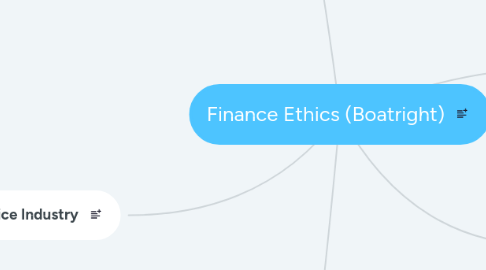
1. Financial Service Industry
1.1. Firms (= profit maximization)
1.1.1. Nature of corporation
1.1.1.1. Legal Fiction
1.1.1.1.1. Agency Theory = Shareholder primacy
1.1.1.2. Real Entity
1.1.1.2.1. Stakeholders Theory = Contractual Theory
1.1.2. Roles and relationships
1.1.2.1. Agent
1.1.2.2. Fiduciaries
1.1.2.3. Professionals
1.1.2.4. Conflicts of interest
1.1.2.4.1. Free market approach
1.1.2.4.2. Managing Conflicts of interest
1.1.3. Retail Financial Services
1.1.3.1. Deception and Concealment
1.1.3.2. Responsibility to protect
1.2. Credits
1.2.1. Credit card
1.2.1.1. Opportunities for abuse
1.2.1.2. Ethical concerns
1.2.2. Mortgage lending
1.2.2.1. Securitization
1.2.2.2. Predatory lending
1.2.2.3. Issues with subprime mortgages
1.3. Microfinance
1.3.1. Group lending
1.3.2. Ethical issues
2. Financial Management
2.1. Designation of an objective (SWM)
2.1.1. Pursuing SWM
2.1.1.1. Short-term objective
2.1.1.2. Long-term objective
2.1.2. Measure of SWM ($ / share)
2.1.3. SWM versus CSR
2.1.3.1. Milton Friedman
2.1.3.2. Trade-offs
2.2. Corporate Governance
2.2.1. Control
2.2.1.1. Nature of the Corporation
2.2.1.1.1. Legal Fiction
2.2.1.1.2. Real Entity
2.2.1.2. Role of Shareholders
2.2.1.2.1. Residual risk bearer
2.2.1.2.2. Monitor managers
2.2.1.3. Role of Board of Directors
2.2.1.4. Role of CEO
2.2.2. Challenges
2.3. Risk Management
2.3.1. Entreprise Risk Management (ERM)
2.3.1.1. Responses to risk
2.3.2. Ethical issues
2.3.3. Impacts of RM
2.3.4. Four issues with RM
3. Financial Markets
3.1. Markets
3.1.1. Rules of markets
3.1.1.1. Market failures
3.2. Orderliness of Markets
3.2.1. Fairness
3.2.1.1. Fairness & Efficiency
3.2.2. Equal information
3.2.2.1. Fairness & Equal information
3.2.3. Equal bargaining power
3.2.4. Fraud and manipulation
3.2.4.1. Mandatory disclosure
3.2.5. Insider Trading
3.2.5.1. Property Rights
3.2.5.2. Fairness
3.2.5.3. Fiduciary Duty
3.3. Investments
3.3.1. Market Timing (MT)
3.3.2. Late trading
3.3.3. Personal trading
3.3.4. Soft-dollar brokerage
3.3.5. Relationship Investing (RI)
3.3.5.1. RI as investment strategy
3.3.5.2. RI and fiduciary duty
3.3.5.2.1. Improving corporate governance
3.3.6. Socially Responsible Investing (SRI)
3.3.6.1. SRI( Past vs Today)
3.3.6.2. SRI Six Principles
3.3.6.3. SRI and performance
3.4. Financial Engineering
3.4.1. Derivatives
3.4.1.1. Speculation
3.4.1.2. Suitability
3.4.2. High-frequency trading (HFT)
4. Definition of Ethics
4.1. Elements of Ethics
4.1.1. Ethical Framework in Finance
5. Need for Ethics in Finance
5.1. Scandals
5.1.1. Causes of wrongdoing
